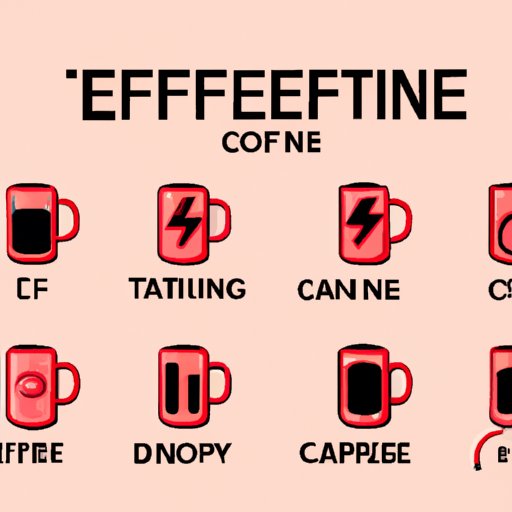
Can Too Much Caffeine Make You Tired?
Caffeine is a central nervous system stimulant that is widely consumed around the world. Millions of people rely on caffeine for an extra boost when they feel tired or sluggish. However, despite the stimulant’s reputation as an effective energy-boosting substance, some people report that caffeine makes them feel more tired instead of increasing their energy level. This is a surprising phenomenon that seems to defy the logic of caffeine’s effects. In this article, we will explore the science behind caffeine’s effects, the reasons why caffeine sometimes leads to fatigue rather than alertness, and strategies for responsible caffeine consumption that can ultimately help to avoid tiredness.
The Paradox of Caffeine: Too Much Can Make You Tired
Caffeine is a natural substance that works by blocking adenosine, a brain chemical that makes us feel tired and relaxed. Adenosine builds up in the brain throughout the day, leading us to feel increasingly tired the longer we stay awake. By blocking adenosine, caffeine tricks the brain into feeling more alert and awake, improving focus and productivity.
However, the amount of caffeine required to increase alertness varies from person to person. Some people are highly sensitive to caffeine, while others may require more caffeine to feel the same effects. Generally, consuming 400 milligrams of caffeine per day (the equivalent of about four cups of coffee) is considered safe for most adults. However, consuming more caffeine than your body can handle can lead to unwanted side effects, including insomnia, jitters, and increased heart rate.
When consumed in moderate amounts, caffeine can make us feel energized and alert. However, too much caffeine can have paradoxical effects. Excess caffeine can interfere with sleep quality, disrupt normal circadian rhythms, and cause fatigue rather than alertness. This is because caffeine can overstimulate the central nervous system, interfering with its ability to function normally.
The Dangers of Caffeine Binges: Why Overdosing Doesn’t Work
In an attempt to boost their energy levels, some people turn to caffeine binges, consuming large amounts of caffeine in a short amount of time. This approach is problematic for several reasons. First and foremost, overdosing on caffeine is associated with numerous health risks. Consuming more than 500-600 milligrams of caffeine in a day can lead to side effects such as rapid heartbeat, anxiety, and even seizures.
Second, caffeine binges are not an effective long-term strategy for boosting energy. Caffeine provides a temporary energy boost, but it doesn’t address the underlying causes of fatigue. Relying on caffeine to stay awake can lead to a vicious cycle of dependence, making it harder for you to function without caffeine.
Energy drinks are a common source of caffeine for those seeking a quick boost. However, energy drinks contain high levels of caffeine and other stimulants, making them potentially dangerous when consumed in excess. In addition, energy drinks can also have effects on the body’s hydration levels and blood sugar, further impacting fatigue and energy levels.
Caffeine & Sleep: A Complicated Relationship
Understanding the relationship between caffeine and sleep is critical to avoiding fatigue. Sleep cycles are regulated by the circadian rhythms of the body, which are complex and delicate. Caffeine can impact sleep cycles by interfering with the production of melatonin, a hormone that regulates sleep.
Drinking caffeine late in the day can contribute to insomnia and impact the ability to fall asleep. Moreover, even if caffeine doesn’t interfere with falling asleep directly, it can reduce the quality of sleep. Disrupting healthy sleep patterns can impact energy levels, leading to fatigue even when you are awake.
How to Avoid the Caffeine Crashes: Strategies for Smart Consumption
If you want to use caffeine effectively to avoid fatigue, you need to use it strategically. The following tips can help you manage caffeine consumption:
- Start with a moderate dose and then adjust as needed
- Limit caffeine intake to 400 milligrams daily
- Drink water throughout the day to stay hydrated
- Avoid consuming caffeine after 2 pm
- Avoid relying on caffeine as a replacement for sleep
- Combine caffeine with physical activity to enhance alertness
Caffeine: The Surprising Connection Between Energy and Anxiety
For some people, caffeine can trigger anxiety and lead to feelings of increased tiredness. This is because caffeine stimulates the release of adrenaline, a hormone that increases heart rate and blood pressure. In people who are sensitive to caffeine, this can lead to jitteriness and anxiety.
If you are highly sensitive to caffeine, it’s important to manage your intake carefully. Consider switching to decaffeinated beverages or reducing your caffeine intake gradually to lower your overall tolerance.
Conclusion
Caffeine is a powerful stimulant that can provide an energy boost when consumed responsibly. However, using caffeine irresponsibly can lead to paradoxical effects, causing fatigue instead of alertness. By understanding the relationship between caffeine and sleep and using caffeine strategically, you can harness the positive effects of caffeine without experiencing unwanted side effects.
Remember, responsible caffeine consumption is critical to reducing the likelihood of tiredness and fatigue and maintaining overall health. Use caffeine wisely, and you can enjoy the benefits of increased energy and productivity.




